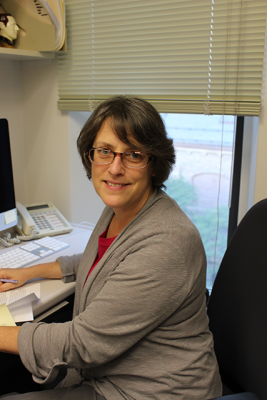Poets Out Loud Returns for 2015-16
Professor, Editor and Director of POL Prize Series, Elizabeth Frost. (PHOTO BY ZANA NAJJAR/THE OBSERVER)
October 5, 2015
Poets Out Loud (POL) is an annual series that encourages the submission and reading of poetry. Each year, prizes are awarded to the most talented authors; one potential prize is a publication of their work by Fordham Press. The mission of POL is to bring together poets from all backgrounds and provide an opportunity to share works and listen to others recite theirs. When asking Heather Dubrow—Boyd chair for Poetic Imagination, professor and the director of reading series— about the criteria of poetry picked, she replied, “The main criterion is respect for the poetry, but we also always represent a range of poetic styles, ethnicities and sexualities, and include both distinguished poets and ones at earlier stages of their careers.” Poets Out Loud is a safe place for people to creatively express themselves and have the exciting potential of being published.
Professor, Editor and Director of POL Prize Series Elizabeth Frost explained the criteria for how poems are selected. “Over the years, I have learned what a big difference there is between a series of good poems and a coherent book of poems. While many of the hundreds of entries we receive contain excellent poems—they clearly are from poets who have powerful things to say and the skill to express them—the manuscripts that end up being named as finalists also have a shape or a consistency as a volume that makes them noteworthy,” Frost said.
In a digital age where almost everything is on the internet, it is easy to be distracted by the media and see a lack of written works such as poetry. However, both Dubrow and Frost agree that the internet age is merely a tool for the distribution of poetry.
“I don’t see poetry as antithetical to social media or to technological change in general—poems are often shared and quoted on social media; many poets incorporate digital experiments in their work,” Dubrow expressed.
“There have been recent projects by poets using Twitter and other social media platforms for new types of poetic practice. But I do think that the speed of digital culture is sometimes so numbing that people turn to poetry to slow things down–to experience language and perception fully, in the instant, and to be able to reflect on that experience over time,” Frost added.
The infinite amount of information on the web also contains a more accessible outlet for poetry, as both professors point out. All POL events are held in the 12th Floor Lounge at Fordham College at Lincoln Center.












